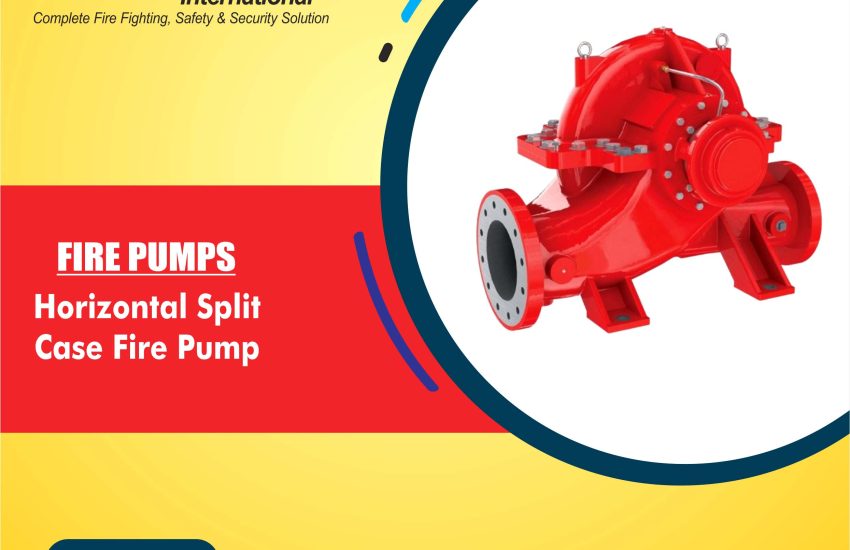Horizontal Split Case Fire Pump are vital components in fire protection systems, especially for commercial, municipal, residential, and industrial applications. These pumps handle high-pressure and large-volume water flows to ensure safety during a fire. The performance and longevity of these fire pumps depend significantly on the materials used for construction. This guide provides a detailed look at the standard and specialized materials used in horizontal split case fire pumps, along with their benefits, design features, and operational limits.
Standard Materials for Horizontal Split Case Fire Pumps
The materials used in horizontal split case fire pumps are essential to their durability and effectiveness. Below are the most commonly used materials:
- Cast Iron
Cast iron remains a cost-effective and durable choice for horizontal split case fire pumps. It offers high strength and corrosion resistance, making it suitable for a variety of applications. - Ductile Iron
Ductile iron, also known as nodular cast iron, provides greater flexibility and strength than traditional cast iron. It resists corrosion, cracking, and wear, which makes it ideal for environments subject to stress and vibration. - Carbon Steel
Carbon steel offers versatility and strength. It resists wear and is cost-efficient, making it suitable for many applications that do not involve highly corrosive environments.
Metallurgist Available for Sea/Brackish Water Applications and Harsh Environments
For applications exposed to seawater, brackish water, or other harsh environments, fire pumps must withstand corrosion and other environmental challenges. To meet these demands, several specialized metallurgist are available:
- Stainless Steel
Stainless steel resists corrosion, making it perfect for use in seawater and other harsh environments. Its durability and strength make it a reliable choice for critical applications. - Duplex and Super Duplex Stainless Steel
Duplex and super duplex stainless steels offer superior corrosion resistance, particularly in chloride-rich environments. These materials provide higher strength and resist stress corrosion cracking, ensuring pump reliability in demanding settings. - Nickel-Aluminum-Bronze
Nickel-aluminum-bronze alloys are excellent at resisting seawater corrosion and erosion. Their ability to withstand cavitation ensures long-term service in offshore and marine applications.
Benefits of Horizontal Split Case Fire Pumps
Horizontal split case fire pumps offer several benefits that make them essential in fire protection systems:
- Ease of Installation and Maintenance
These pumps are designed for easy installation and straightforward maintenance. Their split casing design allows quick access to internal components, reducing downtime and labor costs. - Wide Range of Applications
Horizontal split case fire pumps are highly versatile. They provide reliable fire protection in commercial, municipal, residential, and industrial buildings, among other facilities. - Materials Available for Seawater Service
With special metallurgist, horizontal split case fire pumps can perform effectively in seawater or brackish water applications. This ensures reliable operation in challenging environments.
Design Features of Horizontal Split Case Fire Pumps
Horizontal split case fire pumps come equipped with features designed to meet industry standards and enhance performance:
- NFPA-20 Design
These pumps are designed to comply with NFPA-20 (National Fire Protection Association) standards for fire pump installations, ensuring they meet the necessary safety and performance requirements. - UL-448 Listed
Horizontal split case fire pumps are UL-448 listed, meaning they meet the rigorous Underwriters Laboratories standards for fire pump performance and safety. - FM-1311 Approved
FM-1311 approval from Factory Mutual (FM) Global ensures these pumps are reliable for demanding fire protection systems.
Operational Limits of Horizontal Split Case Fire Pumps
- Pressure
Horizontal split case fire pumps operate at pressures ranging from 40 to 355+ PSI, providing the necessary pressure for large-scale fire protection systems. - Flow
These pumps can deliver water flows ranging from 150 to 5000 GPM (gallons per minute), meeting the diverse needs of fire protection across various industries. - Drive Options
Horizontal split case fire pumps offer both electric and diesel motor options. Electric motors work well where power is reliably available, while diesel motors are ideal for remote locations or off-grid environments.
Applications of Horizontal Split Case Fire Pumps
Horizontal split case fire pumps are used across many sectors due to their reliability and versatility. Some common applications include:
- Commercial Buildings
These pumps are ideal for high-rise commercial buildings, where fire protection systems need to handle large volumes of water under high pressure. - Municipal and Residential High-Rise Buildings
Horizontal split case fire pumps are essential in municipalities and residential high-rise complexes, where they provide reliable fire protection for all building occupants. - Large Industrial Premises and Storage Warehouses
Industrial facilities such as factories and warehouses require strong fire protection, and these pumps provide the necessary flow and pressure to meet such demands. - Offshore and Remote Facilities
Offshore rigs and remote facilities depend on horizontal split case fire pumps to protect against fire hazards, especially where harsh environmental conditions prevail. - Airports and Power Stations
Airports and power stations use horizontal split case fire pumps to safeguard critical infrastructure, ensuring continuous, reliable fire protection.
Conclusion
Horizontal Split Case Fire Pump play an essential role in modern fire protection systems. With a variety of construction materials, including standard options and specialized alloys for harsh environments, these pumps offer long-lasting performance and reliability. Their ease of installation and maintenance, along with compliance with industry standards like NFPA-20, UL-448, and FM-1311, make them the ideal choice for commercial, industrial, and residential applications.


